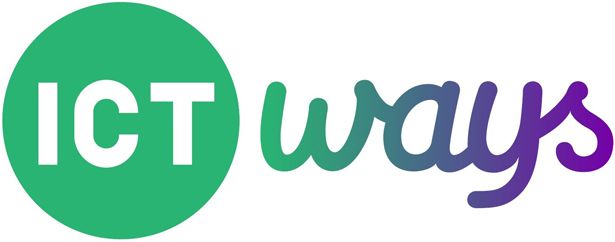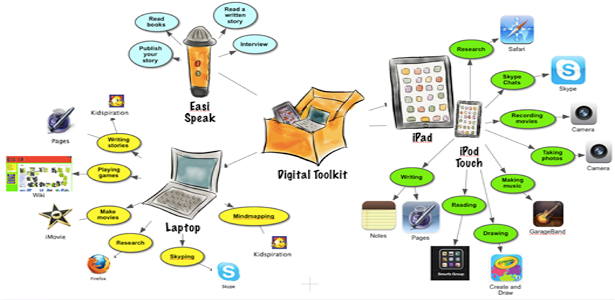WELCOME!!! to my blog !
Smart Learning With Nadya Sukmawati
What is ICT ?
ICT is concerned with the storage, retrieval, manipulation, transmission or receipt of digital data. Importantly, it is also concerned with the way these different uses can work with each other.
Learning With ICT
Learn ICT is an educational web site aimed at providing information, resources and links to appropriate web sites covering the National Curriculum from the Foundation Phase through to Key Stage 5.
Learning Process with ICT Ways
This network has as main objective to draw a roadmap of the implementation/use of Information and Communication Technologies in Primary and Secondary Schools in order to assess their use and thus design guidelines in order to find best practices of ICT use in teaching-learning processes.
What is the Digital Content Toolkit?
The Digital Content Toolkit provides information, support, tools, ideas, models, research, and a community of practice for educators interested in using flexible computer technologies to reach and teach diverse learners.
Wednesday, May 28, 2014
The 5 Easy Steps to Building Your Vocabulary
There are a lot of good strategies for building your vocabulary — learning the meaning of suffixes, prefixes, and roots of words, going through word lists and making flash cards for the words you don’t know, and signing up for a daily “Word of the Day” email from a website likeMerriam-Webster.com, to name a few.





Catering Your Vocabulary to Your Crowd
Understanding Beginning Writing Skills in Preschoolers
By Kristin Stanberry It’s easy to keep track of your preschooler’s growth in height and weight. But how can you measure your child’s development in other areas? For instance, can you tell if he or she is learning and mastering age-appropriate writing skills? As your child’s parent and first teacher, there is no one better to observe and gather information about the progress she is making during the preschool years. The questions and tips that follow will help you understand what type of early writing skills your 3- and 4-year-old child should be developing and how you can support her budding writing skills. Is your child developing age-appropriate writing skills?The most important thing for parents to remember is that writing during the preschool years is, well, messy! The goal is to help children understand how writing works, that it connects in meaningful ways to reading, and that it communicates information, through words and symbols. Do you know what basic writing skills your child should be learning and mastering at ages 3 or 4? Review the following questions, and note how your child is doing in each area. Does my child:
Encouraging early writing skills at homeNow that you understand some of the beginning writing skills your child should have, you can reinforce those skills and help her make further progress. It’s easy (and fun!) to practice writing with your child throughout the day. Here are some activities to try:
Note: If your child has a regular babysitter or daycare provider, be sure to pass these tips along to the caregiver. Promoting early writing skills at preschoolThere is a growing emphasis on structured learning in today’s preschools and while there is still plenty of play time, time in school tends to follow a more rigorous curriculum than in the past. To keep track of how well your young child is learning to write, you’ll want to:
Cause for concern? Where to turn for advice and assistanceIf you’re worried that your child’s writing skills are below-average for her age group, rest assured that not all preschoolers learn to write at the same pace. However, you may want to seek help if your child:
Discuss your concerns with your child’s preschool teacher or other personnel at your local school district. Your child’s pediatrician might also be able to provide guidance. And, be sure that your child has undergone vision and hearing screenings. If you’re concerned that your child may have a learning disability or delay, you should contact your public school system and request (in writing) that a diagnostic screening (at no cost to you) be conducted (available under the Individuals with Disabilities Education Act). http://www.getreadytoread.org/early-learning-childhood-basics/early-literacy/understanding-beginning-writing-skills-in-preschoolers |
How to be a better reader
The importance of reading
What makes texts difficult to understand
- the text has many unknown words
- the text has long, complicated sentences
- the text is about a topic you know nothing about
- the text is about a topic you find boring
- the text has small print, long paragraphs, no pictures
- the text has been badly written
- you are feeling tired
- you are distracted
- you don't know the important cohesion markers
- you don't know why you have been asked to read the text
How to understand more of what you read
- 1. Know your reading purpose - The way you read a book or a text depends very much on your reasons for reading it. This is why it is so important to know your reading purpose. You should read a question in your math exam differently from an entry in an encyclopaedia which you are looking at quickly to find out the date of an event. The kind of reading you do in class or for your homework is different from how you read a novel for pleasure in the summer vacation.If you know your reading purpose - perhaps by looking first at the questions you must answer after reading - you can choose the best reading method.
If your teacher gives you something to read and doesn't tell you what you need to find out from the text or what you will do after the reading, ask her (or him)!
- 2. Choose the appropriate reading speed - ESL students often take a long time to do their work because they read everything slowly and carefully. Often, however, one of the following speedreading methods will be the best choice:
- Skimming - this is reading a text quickly to find out what information it contains. You should skim when, for example, you want to check if a text has the information you need to answer some questions or write a project. It is often enough to look at the first (and last) sentences in each paragraph.
- Scanning - this is reading quickly to find a specific piece of information. You should scan when, for example, you are looking for the answer to a question which you know is in the text.
- Skimming - this is reading a text quickly to find out what information it contains. You should skim when, for example, you want to check if a text has the information you need to answer some questions or write a project. It is often enough to look at the first (and last) sentences in each paragraph.
- 3. Get background information - Find something out about the topic you have to read. The more background information you have, the easier it will be to understand the text. You can get this background information background in your own language. For example, if you are studying the Italian Renaissance, you could read an encyclopaedia or textbook in your own language to find out the most important details about this historical period. Your parents may also be able to give you useful background information. Talk to them in your language.You can sometimes get background information from the text itself. Many writers include a conclusion or summary; if you read this first, it may give you a good start.
- 4. Use all the information in the book - Good textbooks are well-organised, with titles, sub-titles, introductions, summaries or conclusions. Many books also have pictures with captions. Look at all these first before starting to read.Another aspect of good writing is that each paragraph has a topic sentence. A topic sentence is a sentence, usually the first one in a paragraph, that contains the main idea of the paragraph. If you concentrate on understanding the topic sentence, this may help you to understand what comes next.
- 5. Increase your vocabulary - Of course, reading itself is an excellent way to improve your vocabulary, but there are many other things you can do. (More advice on learning vocabulary.) The better your vocabulary, the easier you will find your reading.
- 6. Use your dictionary sensibly - A common mistake of ESL students is to look up each unknown word in the texts they are given to read. Occasionally this is necessary - for example, when reading examination questions. But it takes a long time and can be very boring. It can even make understanding more difficult because by the time you reach the end of the paragraph you have forgotten what you read at the beginning! (Advice on how and when to use your dictionary.)
- 7. Learn the important words that organise text - When you read texts in your science or history books, you will find that most good writers organise their writing with cohesion markers (also called transition words). These are words that connect different parts of the writing and help writers structure their thoughts. If you learn the important cohesion markers, you will find it easier to understand the text.Here are some important cohesion markers: also, therefore, except,unless, however, instead, (al)though, furthermore, moreover,nevertheless, on the other hand, as a result, despite, in conclusion.
- 8. Choose the right place to read - You can’t really expect to understand a difficult book if you are trying to read in the same room with the television on and your little brother distracting you. The same goes for reading in the bus on the way to school. You also can’t expect to read a textbook and listen to music at the same time. Try to find a quiet and comfortable place with good light, and your dictionaries and other materials nearby.
- 9. Choose the right time to read - If you have a difficult text to read for homework, it’s probably best to do this first. If you leave it until last when you are tired, you will find it even more difficult.
Important: If you have tried the advice above and you still cannot understand a text, then it is simply too hard for you. Stop reading and ask someone to help you (your ESL teacher, for example!). Nobody likes to give up, but you will just be wasting your time if you continue to work at a text that is beyond you.
What to read
Most of the time you have to read what your teachers tell you to read. But as you know, reading is an excellent way to improve your English, and so you should try to do some extra reading each week. Here is some advice on how to choose what to read:
- Try not to read something too difficult - There should be no more than about 6-10 new words per page; reading for pleasure should not be hard work!
- Reading easy books is good for you -You will improve your reading skills even if you read simple books, as long as you read lots ofthem. (But you may find you don't really enjoy stories written in English that has been over-simplified.)
- Try to read some non-fiction - Reading non-fiction books or magazines will help you learn some of the words you need to do well in your subject classes. There are millions of pages of non-fiction on the world wide web!
- Choose something that is interesting to you - This is clear. In fact, if you are really interested in a topic, you will probably be able to understand texts that would normally be too difficult for you.
- Surf the internet - You can learn a lot of English just by surfing around on the websites that interest you. This is particularly true if the webpages contain pictures that help you understand the writing.
- Try not to read something too difficult - There should be no more than about 6-10 new words per page; reading for pleasure should not be hard work!
How to Be a Good Listener
Listening is an essential part of communication and listening is very different from hearing. Not to be mean but, sometimes there are people in the world who are chatterboxes. A chatterbox is a person who can never stop talking. You may be one at times. These types of people talk too much and aren't very good listeners. Reading this article can change that, so read it well! Being a good and patient listener helps you solve many of life's problems and see the world through the eyes of others. It enriches your understanding and expands your capacity for empathy.It also increases your contact with the outside world helping you improve your communication skills. As simple as listening (and acknowledging) may seem, doing it well, particularly when disagreements arise, takes sincere effort and lots of practice.
How to Speak English
- 1Start simple. Very few people are true beginners when it comes to English. "Hello," "hi," "How are you?" and numerals have infiltrated most societies. Odds are you know more English than you think.
- Take what you know. For example, "How are you?" That uses the verb "to be." What are other questions just like this? Take what you know and expand it!
- How is she?
How is your father?
How are your children?
How is the weather?
- How is she?
- Start memorizing verbs. The top ten most common verbs in English are the following: "be," "have," "do," "say," "get," "make," "go," "know," "take," and "see."[1] Just knowing these verbs can get you through a lot of basic conversations.
- English is subject-verb-object, in that order. Your subject pronouns are: "I," "you," "he"/"she"/"it," "we," "you," "they." Object pronouns in English are: "me," "you," "him"/"her"/"it," "us," "you," "them." With those verbs and knowing English is SVO, what sentences can you come up with?
- I know her.
She makes it.
He takes us. - http://www.wikihow.com/Speak-English
- Take what you know. For example, "How are you?" That uses the verb "to be." What are other questions just like this? Take what you know and expand it!
Tuesday, May 27, 2014
7Seven Collection
7Seven Collection, located at Gajah Mada street number 2/283, Pontianak . come and shopping ! :D
it sells men's wear, like clothes,trousers,T-shirt etc. i'll give you the newest collection in our boutique right now on my next post . :)
Nad's Accessories
Tuesday, May 20, 2014
How to Use Apps and Your Smartphone to Learn Any Language
These easy steps will help you learn any language and impress your friends.
MORE ABOUT
Start with the basics
Explore with your device
Study vocabulary
Engage in conversation
Obama to host CEOs whose firms are investing in US
 WASHINGTON: President Barack Obama is hosting executives from 11 foreign and US-based companies that have chosen to open new plants or relocate overseas operations in the United States. The gathering on Tuesday is designed to illustrate growing interest in the United States by firms capable of creating high-paying jobs.Obama is showcasing the effect of an improving economy on job growth during a congressional election year that finds the public still anxious about employment and financial wellbeing.
WASHINGTON: President Barack Obama is hosting executives from 11 foreign and US-based companies that have chosen to open new plants or relocate overseas operations in the United States. The gathering on Tuesday is designed to illustrate growing interest in the United States by firms capable of creating high-paying jobs.Obama is showcasing the effect of an improving economy on job growth during a congressional election year that finds the public still anxious about employment and financial wellbeing.Is the UK still the destination of choice for international students?

















